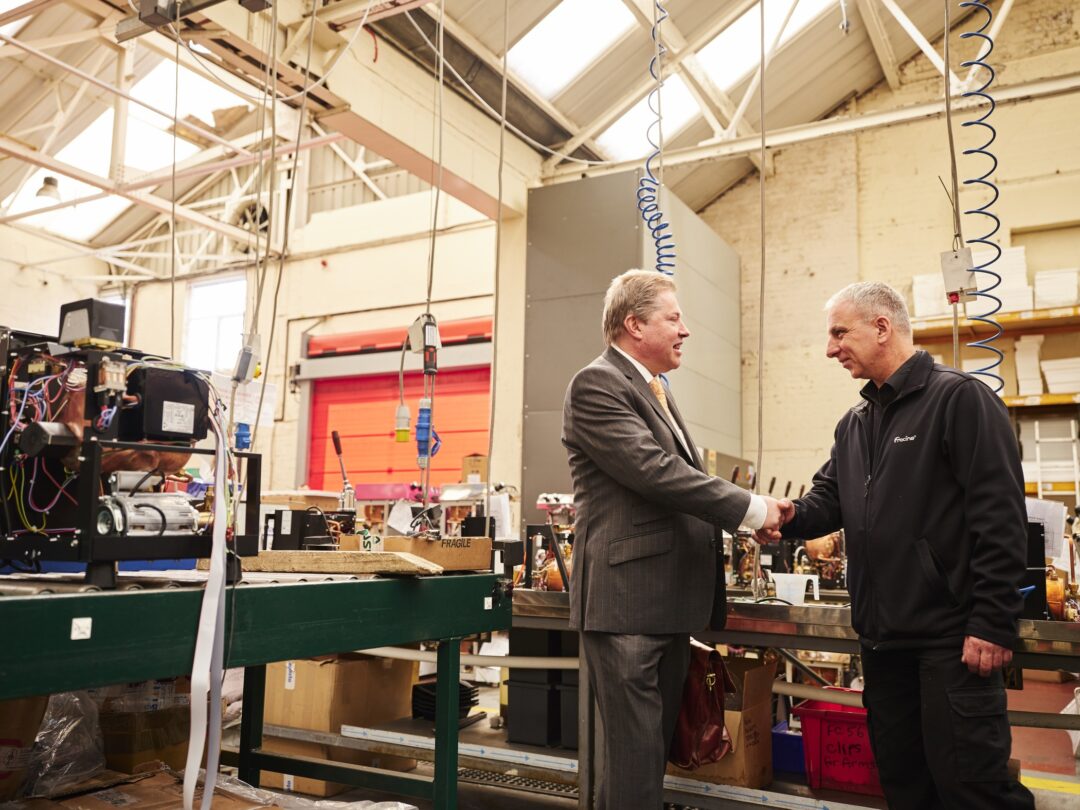Strategy, Legal & Operations
5 Brexit planning tips from CFOs to help your business
Brexit planning should be an important consideration for your business. CFOs from Honda, BMW and Hays share their Brexit planning stories and advice.

What practical steps has your business taken when it comes to Brexit planning?
The first Brexit deadline of 31 March 2019 may have come and gone, but your company still needs to prepare as we look towards the new deadline of 31 October 2019 for the UK to leave the European Union.
At the 2019 CFO Agenda event in London, chief financial officers from businesses such as car manufacturers Honda and BMW, and recruitment firm Hays came together to describe their biggest challenges around Brexit planning and how they’ve handled them.
While there is still uncertainty around Brexit and what it will truly mean for businesses, the stories from the CFOs — and the advice they have to share – may offer food for thought around what your company should be doing to prepare.
Brexit: The UK transition
Need help making changes to your business processes now that a UK-EU trade deal is in place? We're here and ready to support you to make them.

The supply chain — accepting there could be a Brexit no-deal
Kate Curnow is the deputy CFO at Honda Motor Europe Limited, She specialised in corporate tax in a past role at PwC, where she worked with multinationals. She said Honda has a highly integrated supply chain where ‘just-in-time’
delivery systems are essential, so the goal of the company’s Brexit planning was to minimise disruption.
She said: “Very early on, we made the decision that we would prepare for a no-deal Brexit. We would hope for a deal but would also accept that we may have a no-deal. The problem was trying to convince all of our associates that no-deal was possible, and we had to prepare for it.
“There were two years of long and hard work ahead of us to try and get in the position where on the 29 March we did have a no-deal Brexit, we were ready to face that challenge, having our systems and people in place to deal with it.”
One of the biggest concerns that the automobile and manufacturing industry has over Brexit is what happens around tariffs from goods imported from outside the European Union (EU), and what decisions would be made around them.
But Curnow said it wasn’t tariffs that concerned Honda most – it was about administration.
She said: “We were concerned about lorry drivers potentially being stuck at ports waiting to go through. How would we know we had the right paperwork? Did we have solutions for our drivers in making sure they had the right licenses to cross through Europe?”
Dealing with logistical challenges
Michael Kreeft is the CFO at BMW Group UK. For BMW, the UK is the home of its Mini and Rolls-Royce brands, selling 240,000 cars a year. With Brexit preparation, the main focus of its challenge has been to ensure business continuity from the manufacturing and the sales side.
He said: “One example of the measures we’ve taken on the manufacturing side was to change our annual maintenance period for the Oxford plant from the summer, usually around August.
“We decided last year to pull that maintenance period forward to a period where a no-deal Brexit would have affected production – April.”
“We looked at increasing warehouse space for foreign parts supply on both sides of the [English] channel, increasing stock holdings in our product sales operation, and increasing the supply for spare parts.
“Of course, we had to prepare for potential custom changes, which meant changing our IT systems to prepare for all the logistical challenges that might happen due to disruptions at the EU border. Away from Brexit, we’ve seen the disruptions that happen when there are strikes in France.”
BMW Group UK has also been working with more than 400 suppliers, with special “supply days” to discuss with them what BMW was doing to prepare for Brexit and to hear from suppliers about how they were preparing too.
Kreeft added: “I think that working together with suppliers has been key in the overall Brexit process.”
Curnow said Honda has been very keen to make sure its voice was heard by the UK government and the EU, while also making sure that the voices of its suppliers were understood.
She said: “Certainty is essential. It’s uncertainty that causes the most problems, and the sooner we have certainty the more decisions we can make and move on to the future.
“We still have to be prepared for Brexit. We still don’t know what will happen, so it’s therefore taking time and energy, and we still need to be prepared for the unknown.”
BMW has also been affected by the uncertainty. Kreeft said: “Up to 2016, the UK car market was booming. After invoking Article 50 and the general election in 2017, we saw the car market declining and we see the decline continuing today.
“We asked our customers what’s holding back our sales, and Brexit is often the argument given. The uncertainty can really prevent people from spending money.
“I still think UK manufacturing is in a very strong position, but the situation can’t continue for any much longer. We need long-term planning stability, so we need a decision.”
Read more about Brexit
- A guide to doing business in a post-Brexit future
- How will Brexit affect businesses? 12 things you need to know
- 3 ways manufacturing businesses can prepare for Brexit
- No-deal Brexit for professional services: How to prepare
- A guide on preparing for Brexit in case of a no deal
Brexit’s impact on recruitment
Paul Venables is the Group CFO at Hays, the UK and Ireland’s largest recruitment business. He’s in an interesting position as he is the finance chief of the world’s largest white-collar recruitment firm, which is tapped into the current thinking of employers as well as how businesses are planning for the future.
Some of the main concerns that Hays has are around what will happen to immigration, whether the UK will leave the EU with a deal or without one, and the effect that Brexit will have on the skills businesses will have access to.
Venables said: “Having right skills in a business is vitally important, whether you do that by internally transferring skills between highly skilled individuals, or bringing them in from overseas. It’s incredibly important for the UK to get skilled labour.
“Hays is driven by two things: candidates who want to change jobs and clients who want to hire. So, a big positive over this period in time is that there is no weakness in candidate confidence all – which is not just important for our business but the UK economy in general.
“In some respects, changing jobs is the easiest way to get a pay rise.”
From the side of employers, Venables said 90% of Hays’ business centred around “replacement investment”, in which vital employees move jobs from vital roles that employers need to fill quickly and don’t have resources to do so.
This could involve people involved in IT ongoing maintenance projects, which businesses need to keep going internally.
Venables added: “What we’ve been missing out on is that other 10% around large investment in construction for example, in which we’re one of the largest employment providers.
“There are projects where decisions were determined three, five, seven years ago, and are being worked through, so there’s a lot of activity going on. But there’s not a lot of approval or planning in new large-scale building projects.”
For Hays, the problem is that uncertainty is creating a hiatus period, with international companies, whether they have UK subsidiaries or not, stopping or pausing investment causing Hays to lose out when it comes to recruitment in this sector.
Venables said: “The quicker we can get some sort of answer the better, because the quicker we have certainty, the more we can get on with our business and create more wealth.”
Five key takeaways from CFO Agenda
If you’re a CFO or in a finance team at a UK company, you should have already been working towards the Brexit date. However, if you still feel unprepared, consider the following questions:
1. If there is a Brexit no-deal, are you prepared?
Both Honda and BMW faced up to the fact that no-deal Brexit was a possibility, and have made plans and contingencies to ensure they are prepared, whatever the outcome.
Your business may be smaller than those companies but you’ll still need to deal with what might happen if a no-deal Brexit occurs.
Three things you can do are:
- Check your current processes and make plans around any logistics that may need to change when Brexit comes into play.
- Stay on top of Brexit developments and determine what they will mean for your business – incorporate them into your plans.
- Get access to professional help if necessary so your business can take the right steps and aim for minimal disruption.
2. How will your supply chain be affected and what work have you done with your suppliers?
Honda and BMW made plans to minimise the supply chain disruption that would occur from Brexit, which meant lots of work being done internally and with their complex network of suppliers.
By now, you should have examined your supply chains closely, taking care to understand where delays may potentially hit your business and asking your suppliers about their own plans for Brexit regulatory disruption.
If you haven’t done so yet, it’s worth taking these steps now.
3. Where should you be investing in technology?
Businesses in all industries have an opportunity to use digital tools to their advantage, increasing productivity and efficiency to win a competitive advantage.
Brexit could be considered a red line where UK businesses look to push heavily towards reinventing business models, products and services.
It’s worth looking at decreasing friction and risk across the supply chain by utilising data and real-time analytics.
4. What will happen with recruitment and the way you bring in valuable skills?
Depending on what happens to the nature of EU immigration, Brexit could force manufacturers to look at changing their recruitment strategies and consider finding people locally.
You may need to look at groups of people who may not have been focused on before or have been underserved by other businesses — such as single parents, people with disabilities, young people and ethnic minorities.
5. How can you reassure your customers and employees?
If you’re a leader or manager of a UK business, you have a responsibility to be open and transparent with employees, borrowing change management principles such as acknowledging and addressing uncertainty, structuring the transition, and getting external help.
You may not have all the answers but communicate far and wide that you’ll do everything you can to ease the stress and burden.
The biggest issue with Brexit is the conjecture and uncertainty. Make sure you keep up to date with what’s happening and stay in contact with trade associations such as the Department of Trade and the British Chambers of Commerce.
Doing business in a post-Brexit future
Don't just focus on a short-term plan for Brexit. This guide will help you prepare for the long term post-Brexit, with tech and innovation playing key roles.







Ask the author a question or share your advice